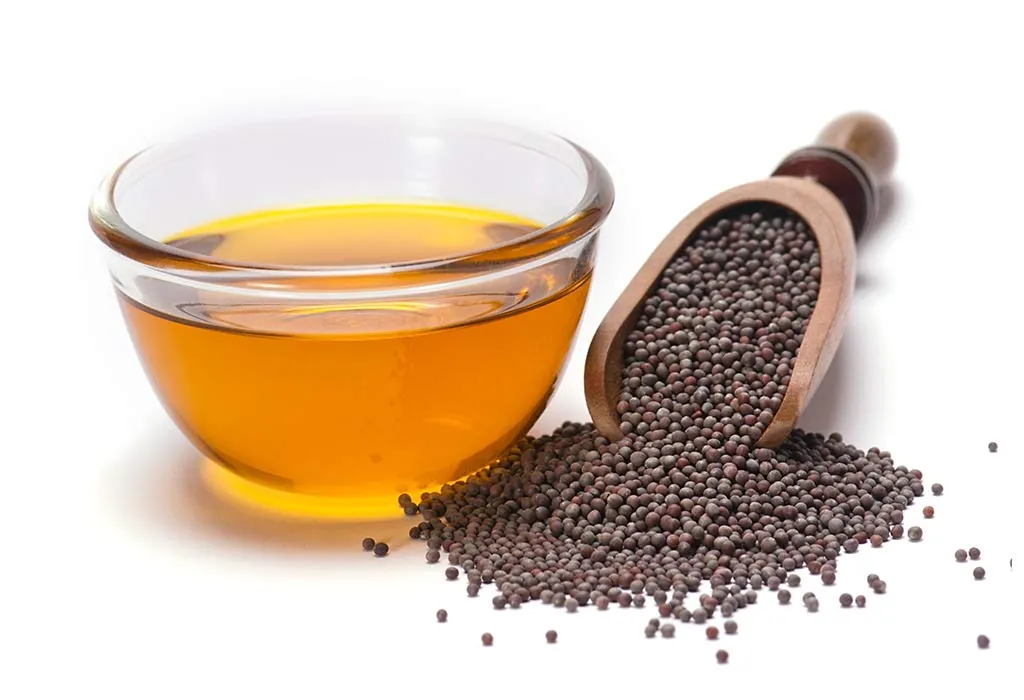Mustard in Pregnancy – Types, Benefits, and Side-effects
Including mustard seeds in pregnancy diet provides essential minerals healthy fats antioxidants and supports digestive health
Mustard, with its unique tangy flavour, is a popular condiment and a flavouring agent in the world of tasty food. From sauces and seeds to oils and leafy greens, mustard is used in a variety of hot and cold meals for flavouring and health benefits. When cravings hit, and you reach for the bottle of mustard to layer your oh-so-needed sandwich, you might come across a very simple question, ‘Is it safe to consume mustard during pregnancy?’ While it is a popular choice for enhancing the taste of dishes in general, it is important to know whether eating mustard during pregnancy is safe. Why? Well, during pregnancy, concerns about food safety and potential effects on the baby’s development become paramount. Mustard in pregnancy offers nutritional benefits, but it’s essential to know the quantity and form that’s best. Let’s delve into this question to help you make informed decisions about including mustard in a pregnancy diet.
What Is Mustard?
Mustard is a plant from the Brassica family that originally grew in cooler parts of Europe. Its seeds and leaves are widely used in Indian cooking, while in Western countries the word “mustard” usually refers to the sauce made from its seeds. The plant’s leaves are rich in nutrients and natural compounds that support good health, making them especially helpful during pregnancy (1).
Can You Eat Mustard When Pregnant?
If you are craving mustard in early pregnancy, the good news is that it’s generally considered safe to eat. You can have foods that contain mustard sauce, seeds, mustard leaves, or even mustard oil during pregnancy. As with most things in pregnancy, moderation is crucial. You should make sure to consume mustard in moderation. If the consumption of mustard for pregnancy is very high, it might sometimes lead to a miscarriage. If you wish to consume mustard seeds, it is better to consult a doctor when you are pregnant.
What Are the Benefits of Eating Mustard in Pregnancy?
Mustard contains essential nutrients that can offer several health benefits. Besides being tasty, let’s see what health benefits mustard provides to a pregnant woman:
1. Powerhouse of Essential Nutrients
Rich in dietary fibre, it aids digestion and prevents constipation—a common issue during pregnancy. Mustard seeds are also rich in essential minerals like iron, calcium, and magnesium, which contribute to the mother’s and baby’s overall well-being (2).
2. Regulating Asthma
Mustard has a high content of selenium and magnesium, which provides you with anti-inflammatory benefits. Therefore, consuming mustard can help you prevent and regulate colds, chest congestion, and asthma when you are pregnant.
3. Preventing Cancer
Mustard is rich in phytonutrients that will help prevent the development of gastrointestinal cancer very effectively. Mustard seeds are great at preventing the growth of cancer cells and inhibit the development of every other cancer while pregnant (3).
4. Boosting Immunity
Mustard seeds have a high content of minerals, such as manganese, iron, and copper. This mineral content present in the mustard will help in increasing the immunity of the body and prevent hazardous infections and other ailments. Also, the sulphur content in the mustard seeds will provide you with antifungal and antibacterial benefits to help fight skin infections during pregnancy (4).
5. Weight Management
Mustard is rich in folates, thiamine, riboflavin, and many other vitamins that are good at promoting the metabolism of the body when pregnant. It also helps to regulate the weight of the body effectively (5).
6. Reducing Cholesterol
It has high amounts of niacin and vitamin B3 that help regulate the cholesterol levels in the body. This will protect you from conditions like atherosclerosis. Adding mustard to the food you eat will also regulate blood pressure and blood flow effectively.
7. Treating Constipation
Mustard comprises mucilage, a unique substance that is thick and slimy. This will help to relieve constipation. The fibre content in the mustard seeds reduces the trouble resulting from constipation.
8. Mitigates Arthritis and Muscle Pain
The selenium and magnesium content in mustard gives you heat-producing and anti-inflammatory benefits that reduce the symptoms of arthritis and muscle pain when pregnant.
Are There Any Side Effects of Consuming Mustard While Pregnant?
You need to ensure that you do not consume excess amounts of mustard when adding mustard seeds, leaves, or sauce to your food, as it might affect your pregnancy and health. Mustard contains a compound called allyl isothiocyanate, because of which it gets its pungent taste. If consumed excessively, this compound might cause irritation and discomfort, especially if you have a sensitive stomach. Pregnant women prone to frequent heartburn or acid reflux should consume mustard in smaller quantities; otherwise, it might exacerbate these symptoms.
Here are some side effects of consuming too much mustard during pregnancy:
- Throat irritation
- Heart-related health problems
- Breathing difficulties
- Fatigue
- Skin blisters, swelling, or damage
- Chronic diarrhoea
- Miscarriage
- In extreme cases, coma and death
Types of Mustard Suitable for Pregnant Women
During pregnancy, choosing the right type of mustard can help you enjoy its flavour safely. Here are several types of mustard that are generally considered suitable for pregnant women:
1. Yellow Mustard
A mild and commonly used mustard, yellow mustard adds a tangy flavour to dishes and is safe in moderation.
2. Dijon Mustard
Known for its smooth texture and sharp taste, Dijon mustard is safe to enjoy in small amounts during pregnancy.
3. Honey Mustard
Honey mustard, with its mild and slightly sweet flavour, is typically safe and can be a tasty addition to sandwiches and salads.
4. Mustard Seeds
Whole mustard seeds in pregnancy can be used in cooking for added flavour. These are safe for pregnant women when used sparingly.
5. Mustard Greens
Mustard greens are leafy vegetables high in nutrients. They’re safe and nutritious when thoroughly washed and cooked.
6. Spicy Brown Mustard
This mustard has a stronger flavour due to coarsely ground seeds. Enjoy it in moderation, as too much spice may cause discomfort.
7. Mustard Oil (in Cooking)
Mustard oil can be safe if properly processed and used in small amounts for cooking, but it’s best to consult your healthcare provider.
8. Stone Ground Mustard
With a coarse texture, stone ground mustard is another option for a flavourful addition to meals and is generally safe during pregnancy.
9. English Mustard
This type is quite pungent, so a small amount goes a long way. Use sparingly to add zest to meals without overpowering them.
10. Whole Grain Mustard
Whole grain mustard is made from whole mustard seeds, offering a unique texture and flavour. It’s safe when used in moderation during pregnancy.
FAQs
1. Is it safe to use mustard oil on my skin during pregnancy?
Mustard oil is often used for massages due to its warming effect. While mustard oil massage during pregnancy is generally safe, some people have skin sensitivities to mustard oil. It’s a good idea to do a patch test and consult your healthcare provider before using it on larger areas (6).
2. Can eating mustard help with pregnancy-related muscle cramps?
Mustard contains magnesium, which can support muscle function and potentially ease cramps. However, mustard should not be relied upon solely for this benefit. Maintaining an overall balanced diet rich in magnesium is more effective for managing cramps.
3. Does mustard help with nausea or morning sickness?
While there is no direct evidence, some people find that the tangy taste of mustard can alleviate mild nausea by stimulating taste buds and digestion. However, mustard’s strong flavour may not work for everyone and could worsen nausea in some cases.
4. Can mustard oil be used for natural labour induction?
In some traditional practices, mustard oil is thought to stimulate the uterus when consumed, but there is limited scientific evidence supporting this. Pregnant women should avoid using mustard oil or any remedy for labour induction without consulting a healthcare provider.
Though eating mustard is considered to be safe, it is best to check with your gynaecologist before you consume it. Including mustard seeds in your food can increase the flavour. When consumed in moderation, it offers multiple health benefits. If you’re unsure about whether to include mustard in your diet, it’s best to talk to your doctor about it. They can offer personalised guidance based on your pregnancy progress.
Have a healthy pregnancy!
Also Read:
Poppy Seeds in Pregnancy
Ajwain during Pregnancy
Jeera Water during Pregnancy
Sunflower Seeds while Pregnant
Was This Article Helpful?
Parenting is a huge responsibility, for you as a caregiver, but also for us as a parenting content platform. We understand that and take our responsibility of creating credible content seriously. FirstCry Parenting articles are written and published only after extensive research using factually sound references to deliver quality content that is accurate, validated by experts, and completely reliable. To understand how we go about creating content that is credible, read our editorial policy here.




































